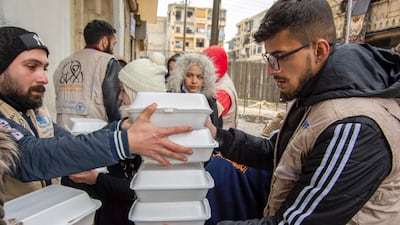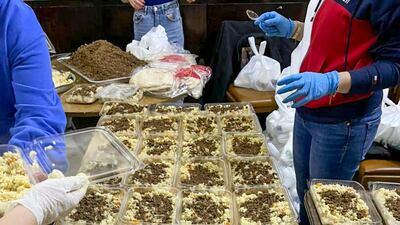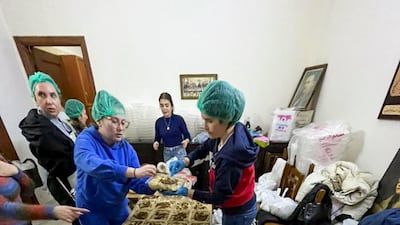Governments must respond with more urgency to an appeal for funds to help those affected by last week’s earthquake in Turkey and Syria, a senior UN aid official has said.
The World Food Programme is flying six aircraft out of the UN depot hub in Dubai this in the next few days, providing food, shelter and emergency kits to Syria.
But Walid Ibrahim, network coordinator of the WFP-managed United Nations Humanitarian Response Depot, said the quake has put extra strain on a region that was already in a dire situation and much more aid is required.
“We need governments to respond to our appeal for funding,” he told The National.
World Food Programme
“There also needs to be more pressure on easing the cross-border activities.
“So far, we’ve only been able to access north-west parts of Syria through one border crossing.”
At least 46,000 people have been killed and millions left homeless by the earthquake that struck on February 6.
Mr Ibrahim estimated the WFP would be able to provide food rations to those in need until the end of the month, hence the need for further funding to provide aid after that time.
The relief packages, being flown on planes from Dubai, includes shelter and emergency kits with food rations from the WFP and its humanitarian partners.
It is appealing for at least $77 million to provide assistance through food rations and hot meals - $50 million for Turkey and $27 million for Syria.
There are 324,000 Turkish citizens and Syrian refugees receiving family food packages in camps and hot meals in municipal community kitchens in Turkey, while 156,000 people are receiving ready-to-eat rations and hot meals in Syria.
The aid is part of regular monthly distributions to 1.4 million people in north-western Syria.
The WFP manages the UN Humanitarian Response Depot in Dubai, with similar outlets in Panama, Italy, Ghana and Malaysia.
“Syria has faced a very difficult economic situation for years and the WFP has had to step in a number of times to help with the needs of the population on the ground,” said Mr Ibrahim.
“Now this earthquake has come on top of what was an already fragile situation.”
The UN also announced a $1 billion appeal on Thursday to help the survivors of the earthquake.
“This is a region that has suffered significantly in recent years and this tragedy has only compounded that suffering,” he said.
On Thursday, Syrian President Bashar Al Assad thanked his “Arab brothers” for their support during the crisis. About 120 aircraft providing relief supplies have landed in Syria.
The UAE has sent 113 flights carrying 3,200 tonnes of aid to Turkey and Syria, the Ministry of Defence said on Sunday.
Lt Col Hamad Al Kaabi, commander of the Emirati Search and Rescue in Syria, is training Syrian emergency services personnel on the ground.
“We are racing against time to qualify the Syrian Civil Defence personnel through an intensive training course on the mechanism of using the advanced technical devices and equipment," he told state news agency Wam.
On Sunday, the UAE said it had opened a field hospital in the Turkish city of Hatay, one of the worst affected by the earthquake.
The hospital, named after President Sheikh Mohamed, has a capacity of 200 beds, in addition to 20 intensive care beds and two operating rooms.
It is the second field hospital set up by the Emirates, with the first in Gaziantep established last week.















